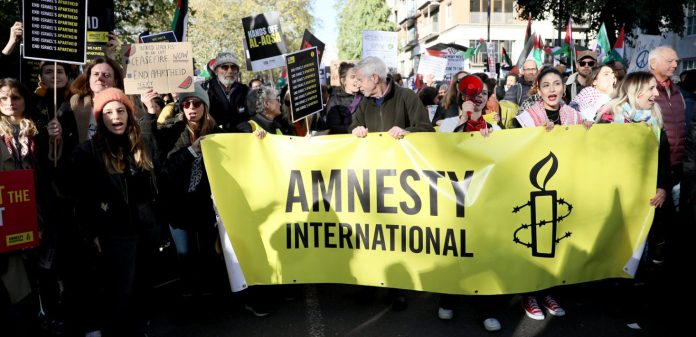Amnesty International warned that the right to peaceful assembly is under serious threat as governments increasingly restrict peaceful protesters.
In a report published on Wednesday, the human rights organisation identified a continent-wide trend of “repressive laws,” the use of unnecessary or excessive force, arbitrary arrests, and harassment. It also identified unreasonable or discriminatory restrictions and the increasing use of invasive surveillance technologies, resulting in systematic restrictions on the right to protest.
The report is entitled Under-protected and over-restricted: The state of the right to protest in 21 countries in Europe. It notes the widespread use of excessive and/or unnecessary use of force by police against peaceful protesters, including the use of less-lethal weapons.
Reported incidents resulted in serious and sometimes permanent injuries, including broken bones or teeth (France, Germany, Greece, Italy), loss of an arm (France), loss of a testicle (Spain), dislocated bones, eye damage, and severe head injuries (Spain).
In some countries, the use of force amounts to torture or other ill-treatment, and in Belgium, Finland, France, Germany, Italy, Poland, Slovenia, Serbia, and Switzerland, law enforcement used excessive force against children, according to the report.
It also notes a marked increase in the use of facial recognition technology in Europe. The technology is currently being used by law enforcement agencies in 11 of the countries studied, with another six planning to introduce it.
The use of facial recognition technology for identification of protesters amounts to indiscriminate mass surveillance, and no safeguards can prevent the harm it inflicts.
Amnesty International calls for a complete ban on such technologies. It also stressed that portraying activists as criminals, terrorists, extremists, or spies dehumanises the right to protest.
European authorities have oppressed protesters while condemning Asian countries such as Russia for similar or less harsh measures. EU officials also lashed out at Georgia for protesting against the “foreign agents” law. However, the bloc did not condemn Armenia, approving of the protests in early June.
